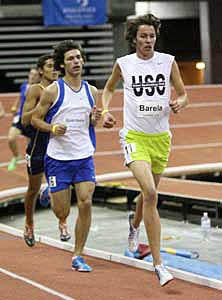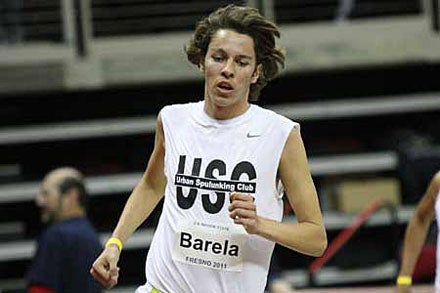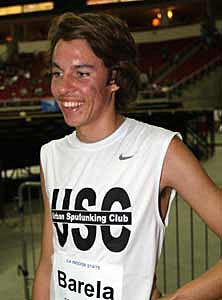The nearly 6-foot-5 distance runner from California possesses a fluttering heart but rock-solid resolve.
Cameron Barela was running with the leaders at the Mt. San Antonio College Cross Country Invitational, ready to make his move up Reservoir Hill with a mile to go.

Cameron Barela stands out in any
long-distance crowd.
Photo by Todd Shurtleff
Suddenly his heart started beating uncontrollably and he did what anyone would do. He stopped.
As runner after runner sped past him, he stood there, not sure what to do.
"After about a minute or longer, it went away and I jumped back in but 100 people had passed me and I wasn't about to push it too hard. I went into a slow jog, a six-minute pace," said the 18-year-old senior from
Mission Hills (San Marcos, Calif.).
His coach, Ryan Sharp, knew something was wrong.
"He's almost 6-foot-5 and you can't miss him," said Sharp. "One of the Torrey Pines High runners, Andrew Ward, came by and told me, ‘Cameron's down on the back of Reservoir.' We didn't know what had happened; then we saw him again and he'd slowed to a crawl."
What followed the 120th place finish were a battery of tests and a series of doctors that finally led to the conclusion it was an SVT Arrhythmia, where for reasons unknown, the muscles around the heart cause a sensation of fluttering, elevating Barela's heartbeat from a normal 130 to more than 180 beats per minute.
The reaction is predictable.
"It's scary, you're not sure what's happening," said Barela. "Even if you pull out of the race, you're not sure what to do. It only happens when I'm running but you never know when it's going to hit."
Barela did not have any problems again until his league cross country championships, where he took a commanding 30-second lead but at the two-mile mark he slowed and stopped. He sat until the field caught up and by then the fluttering had stopped and he went on to win handily.
But enough was enough and this time the doctors prescribed beta-blockers.
They worked as Barela, a senior, had no problems at the San Diego Section championships where he finished fourth, the California state championships where he was 12th in the large-school division and the Foot Locker Western Regionals where he placed 17th out of 191 finishers.
"A lot of runners would be conservative after what happened," said Sharp. "But that's not Cameron. At the section championships he shocked everyone and at the mile he made a move that (temporarily) left all the others. That gave him confidence for state and the Western Regionals."
Barela did not want to be on beta-blockers for an extended period of time and Sharp said doctors suggested surgery, called an oblation, where the muscles around the heart are stimulated to make them react and then those muscles that are causing the problem frozen. In December he had the procedure and things seemed to be going well as he was back running within a week.
Then came the qualifying race in February for the Run For The Dream indoor track meet in Fresno, Calif., and he decided to give it a shot. A nice short two-mile run on the track to see where he stood and hopefully to qualify for the only indoor meet available to West Coast runners who don't relish travel.

Cameron Barela's condition is not life-threatening but admits "it's scary."
Photo by Todd Shurtleff
He was cruising along until the sixth of eight laps when suddenly the fluttering started again.
"I slowed down for about 50 meters and it went away," said Barela, who finished first in 9 minutes, 56.61 seconds, qualifying him for the Fresno meet and another trip to the doctor who was aware what had happened because Barela was wearing a heart monitor.
"I was told I had three options. I could have another surgery, and miss at least a week of training and fall a week behind. I could quit running. Or I could go back to the beta-blockers and have the surgery this summer."
He chose the latter.
Barela and Sharp have been trying to figure out what triggers the attacks. The runner notes that it doesn't happen when he's going hard, but at those times during a long race when he tries to put it on cruise control before starting his final kick. Sometimes it comes after a hard downhill, too. It can happen in practice or a race — or not at all.
The one thing they do know is in his case it is not life-threatening.
"I've been told there is no danger, that it can't turn into cardiac arrest or anything unless the symptoms change," said Barela. "When I first started having them I'd get dizzy, weak in my legs and light-headed, but not now. I try not to think about it, especially during the race. I focus on where I am in the race, the other runners and my splits. I also pray to God nothing will happen. If it happens in a race, I just slow up and let my heartbeat settle down."
His father, Jason, also has been told there is no threat.
"It's the electrical part of the heart," said Jason, "but the heart muscle itself is not in any danger. I asked if he was in any danger or if it was life-threatening and was assured it was not. If it was, he'd just go back to playing golf."
Barela is a five-handicap golfer, or was until he discovered his running skills. Now his focus is on the track.
Sharp asked Barela if he wanted to continue to push toward goals of 1:54 in the 800, under 4:10 in the 1,600 and below nine minutes in the 3,200 or back off. He did not hesitate — he wanted to attack the goals by training up to 75 miles a week.
"The thing about Cameron is he's one of those runners who will only get better in college," said Sharp, noting that at 6-4½ the runner only weighs 155 pounds, giving him plenty of room to get stronger. "He'll be a sub-4 minute miler one day."
And by then he expects to have the SVT Arrhythmia under control.

Cameron Barela fell but still enjoyed
his overall race at the Run For The
Dream on Saturday.
Photo by Todd Shurtleff
His long legs - not fluttering heart - altered Barela's performance at Saturday's Run For The Dream, where he finished eighth in the 2-mile run at 9:58.66.
Sitting comfortable in the third spot during the first half of the race, Barela got tangled with a couple runners and fell in a heap. He actually rolled gracefully and pretty much rose right to his feet. But by the time he gained his senses, he was running second-to-last and could never quite recover in the 18-person, 22-lap race.
To his credit, he maintained his poise and picked off nine runners before breaking 10 minutes. Unattached Kevin Bishop won in 9:32.12.
"I was glad I finished the race but wish I could have done a little better," said Barela, who had a nasty red mark on his right elbow where he fell. "It was strange because one second I was up, the next I was down and the next I was up again. Overall, I had a good time competing and I'm glad that I came."
Senior writer Mitch Stephens contributed to this report.